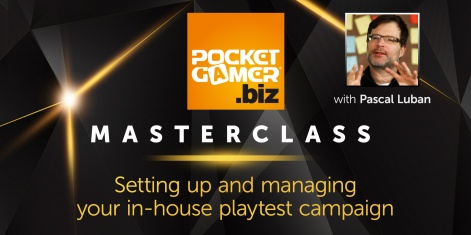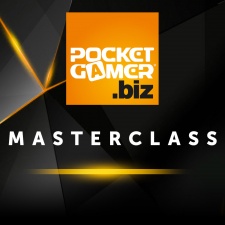The next round of PocketGamer.biz MasterClasses are only just around the corner and we can’t wait to show you what we have in store for you this time.
If this is your first time hearing about our MasterClasses, they’re a series of deep-dive workshop sessions that take an in-depth look at practical games design topics. We work with the finest industry experts to create professional, half-day activities featuring tutorials, lectures and breakout groups, all accessible from the comfort of your home office.
On June 8-10, you can expect to explore a range of key topics, from game pitching and mastering data, to live ops and UX. Today, we'd like to introduce Pascal Luban, a game designer and creative director with an impressive 25-year history in the games industry. Luban will lead a session titled “Setting Up and Managing Your In-house Playtest Campaign” on Tuesday, June 8th from 14:00 - 17:00 (UK time).
Pascal has led design teams on both triple-A console games including Tom Clancy's Splinter Cell: Pandora Tomorrow and Chaos Theory; Alone In the Dark: The New Nightmare; and Wanted: Weapons of Fate, as well as mobile titles such as Wars and Battles, and The One Hope. He set up and managed the playtest facility at the Ubisoft studio in Annecy where the multiplayer mode of Splinter Cell games was developed.

Pocket Gamer: Tell us a bit about your company
Pascal Luban: Being freelance gives me the great opportunity to work on all types of missions such as game concepts, level design, storytelling, tuning and more - for all genres, all platforms, and all types of clients, studios and publishers; small and large. Having worked on both gamer-focused triple-A games and freemium mobile titles allows me to merge the best of both worlds.
What does your role entail?
I adapt to my clients' needs. For them, I can design entire games, which I do about once a year, or work on specific aspects such as onboarding, economic design, and storytelling.
What topic will you cover in your MasterClass?
Nothing beats the responsiveness and relevance of playtest sessions run within the development studio
I will explain, step-by-step, how a studio can set up its own internal playtest facility. Playtesting is the quality assurance of a game and in-house playtesting is the most cost-effective way to do them. Playtests can be outsourced or managed by the publisher’s own playtest facility, but nothing beats the responsiveness and relevance of playtest sessions run within the development studio.
This masterclass will explain how to set up your own in-house playtest structure and how to run a playtest campaign while remaining affordable - even for very small studios. Some of the key takeaways will include:
- A step-by-step method to prepare and manage a playtest campaign
- Sample documents for the preparation of a playtest session, and its debrief
- Best practices to find the playtesters most adapted to your needs
Who is this MasterClass for?
Project leaders, production directors and creative directors that need to organise or manage a playtest campaign.
Tell us a little bit about the key takeaways people can expect from the session
This is a very practical session. By the end of the masterclass, attendees will know exactly how to set up their own playtest facility and to run a playtest campaign.
Participants will come away with a step-by-step method to prepare and manage a playtest campaign, as well as best practices to recruit the playtesters most adapted to your needs. This will include sample documents for the preparation of a playtest session and its debrief.
Finally, what are your thoughts on the games industry going forward? What major trends do you predict over the next 12 months?
I think we will continue to see the development of live games, aka 'games as a service', but we'll also witness the growing importance of quality storytelling in games. On mobile, I expect to see increasing inroads of midcore games.





















